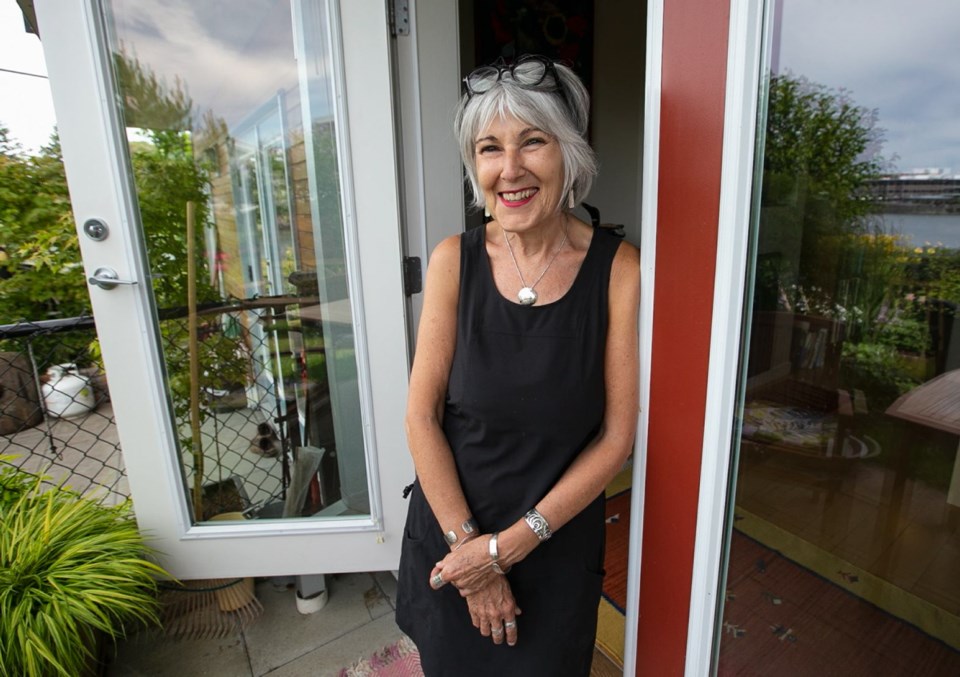Winning the Griffin Poetry Prize — the biggest cash prize for poetry in Canada — felt just like having her first poem accepted for publication, says Vic West’s Eve Joseph.
“I remember walking to the rural post box and seeing this letter,” she said of her first acceptance, in 1998 when she was living in Brentwood Bay. “The Griffin was just like going to the rural post office.”
At the time, Joseph was 45 and a Saskatchewan-based publisher had accepted her poem The Sound of Water.
She was awarded the Griffin prize for her newest book of poetry, Quarrels, at a ceremony in Toronto last week. Created in 2000 by businessman and philanthropist Scott Griffin to raise awareness of the cultural importance of poetry, the Griffin Poetry Prize is awarded to one Canadian and one international poet each year. Kim Hyesoon of South Korea and translator Don Mee Choi won this year’s international prize.
The award comes with $65,000, which Joseph said will help fund writing getaways. She needs to be completely alone to write, something hard to come by in the cosy Victoria West townhouse she shares with her husband, Patrick. To focus on writing, Joseph checks into the Sylvia Hotel in Vancouver, or stays at a friend’s cabin in Roberts Creek.
“I realized that creativity and domesticity don’t know how to live together in me. So I need to leave the domestic to write,” she said.
Joseph has always loved poetry, tracing her fondness back to a memory from Grade 5, growing up in North Vancouver. She was sitting in a long row of desks complete with inkwells, listening to her teacher, Mrs. Black, read The Tyger by William Blake. “I was so captured by it,” she said. “Everything disappeared except the sound of her voice in that room.”
As a child and teenager, she loved to write, sharing her work in school and with her mother. But after finishing school, Joseph stopped writing for 35 years.
She found her way back to poetry when she wrote a 12-page poem for her mother’s 80th birthday. “It was a terrible poem,” Joseph said, with a laugh. “She loved it, but I knew nothing about, you know, how to write poetry. I just knew I loved it.”
Coming back to writing wasn’t a conscious decision for Joseph. Instead, she said it was like coming back to herself. She enrolled in a creative-writing program at the University of Victoria, which helped her learn the craft and opened doors for her.
“I never thought: ‘I’ll be a poet,’ ” Joseph said. “I think I had to live. I think I had to do a lot of things before I came to writing.”
Live, she did. In her decades away from writing, Joseph worked on freighters as a sailor (and has the tattoo to prove it), earned a degree in social work and a master’s in counselling, raised three children and spent 22 years working in hospice care. She did not put pen to paper, but Joseph believes writing never left her. “I think it’s always been a part of who I was, even though I didn’t write,” she said. “It was sleeping.”
Quarrels is the first poetry book Joseph has published since she had a stroke in 2013, which put her poetry writing on pause for two years. It’s also her first work of prose poetry, a style that is written in sentences and paragraphs instead of verses, but retains poetic qualities.
“It looks like a paragraph, but it’s the hardest form of poetry I’ve ever worked with,” she said. “Because you have to make it not a paragraph. You have to make it poetry.”
Joseph says Quarrels takes real events and stretches them into the surreal, “like a marriage of the real and unreal.”
She points to a poem about an exploding capon as an example. The bird explodes from a pressure cooker, breaks through the ceiling and becomes a weather vane. The exploding capon is a real memory from her childhood.
When Joseph was a child, her mother would leave dinner in a pressure cooker when she went to work so it would be ready for the kids when they got home. One day, a capon exploded from the pressure cooker and stuck to the kitchen ceiling.
“You take the things that are almost unbelievable, and we all have them in our lives, and see how they just come out of real events,” she said.
Joseph credits her “eccentric” mother and a childhood in which truth and fiction were mixed up with inspiring her latest work. Her mother never saw Joseph’s success as a writer. She died four months before Joseph’s first book, The Startled Heart, was published in 2004.



